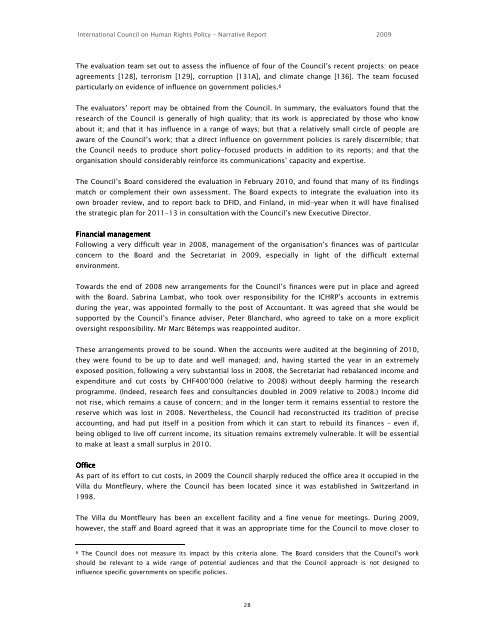NARRATIVE REPORT 2009 - The ICHRP
NARRATIVE REPORT 2009 - The ICHRP
NARRATIVE REPORT 2009 - The ICHRP
Create successful ePaper yourself
Turn your PDF publications into a flip-book with our unique Google optimized e-Paper software.
International Council on Human Rights Policy - Narrative Report <strong>2009</strong><br />
<strong>The</strong> evaluation team set out to assess the influence of four of the Council’s recent projects: on peace<br />
agreements [128], terrorism [129], corruption [131A], and climate change [136]. <strong>The</strong> team focused<br />
particularly on evidence of influence on government policies. 6<br />
<strong>The</strong> evaluators’ report may be obtained from the Council. In summary, the evaluators found that the<br />
research of the Council is generally of high quality; that its work is appreciated by those who know<br />
about it; and that it has influence in a range of ways; but that a relatively small circle of people are<br />
aware of the Council’s work; that a direct influence on government policies is rarely discernible; that<br />
the Council needs to produce short policy-focused products in addition to its reports; and that the<br />
organisation should considerably reinforce its communications’ capacity and expertise.<br />
<strong>The</strong> Council’s Board considered the evaluation in February 2010, and found that many of its findings<br />
match or complement their own assessment. <strong>The</strong> Board expects to integrate the evaluation into its<br />
own broader review, and to report back to DFID, and Finland, in mid-year when it will have finalised<br />
the strategic plan for 2011-13 in consultation with the Council’s new Executive Director.<br />
Financial management<br />
Following a very difficult year in 2008, management of the organisation’s finances was of particular<br />
concern to the Board and the Secretariat in <strong>2009</strong>, especially in light of the difficult external<br />
environment.<br />
Towards the end of 2008 new arrangements for the Council’s finances were put in place and agreed<br />
with the Board. Sabrina Lambat, who took over responsibility for the <strong>ICHRP</strong>’s accounts in extremis<br />
during the year, was appointed formally to the post of Accountant. It was agreed that she would be<br />
supported by the Council’s finance adviser, Peter Blanchard, who agreed to take on a more explicit<br />
oversight responsibility. Mr Marc Bétemps was reappointed auditor.<br />
<strong>The</strong>se arrangements proved to be sound. When the accounts were audited at the beginning of 2010,<br />
they were found to be up to date and well managed; and, having started the year in an extremely<br />
exposed position, following a very substantial loss in 2008, the Secretariat had rebalanced income and<br />
expenditure and cut costs by CHF400’000 (relative to 2008) without deeply harming the research<br />
programme. (Indeed, research fees and consultancies doubled in <strong>2009</strong> relative to 2008.) Income did<br />
not rise, which remains a cause of concern; and in the longer term it remains essential to restore the<br />
reserve which was lost in 2008. Nevertheless, the Council had reconstructed its tradition of precise<br />
accounting, and had put itself in a position from which it can start to rebuild its finances – even if,<br />
being obliged to live off current income, its situation remains extremely vulnerable. It will be essential<br />
to make at least a small surplus in 2010.<br />
Office<br />
As part of its effort to cut costs, in <strong>2009</strong> the Council sharply reduced the office area it occupied in the<br />
Villa du Montfleury, where the Council has been located since it was established in Switzerland in<br />
1998.<br />
<strong>The</strong> Villa du Montfleury has been an excellent facility and a fine venue for meetings. During <strong>2009</strong>,<br />
however, the staff and Board agreed that it was an appropriate time for the Council to move closer to<br />
6<br />
<strong>The</strong> Council does not measure its impact by this criteria alone. <strong>The</strong> Board considers that the Council’s work<br />
should be relevant to a wide range of potential audiences and that the Council approach is not designed to<br />
influence specific governments on specific policies.<br />
28
















